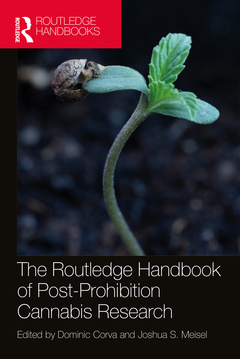The Routledge Handbook of Post-Prohibition Cannabis Research

The place of cannabis in global drug prohibition is in crisis, opening up new directions for socially engaged cannabis research. TheRoutledge Handbook of Post-Prohibition Cannabis Research invites readers to explore new landscapes of cannabis research under conditions of legalization with, not after, prohibition: "post-prohibition." The chapters are organized into five multidisciplinary sections: Governance, Public Health, Markets and Society, Ecology and the Environment, and Culture and Social Change. Case studies from the United States, Uruguay, Morocco, and the United Kingdom show readers alternative ways of thinking about human?cannabis relationships that move beyond questions of legality and illegality. Representing a cross-section of cannabis scholarship, the contributors provide readers with critical perspectives on legalization that are not based upon orthodoxies of prohibition. While legalization signals a global shift in the legitimacy of cannabis research, this collection identifies openings for academics, policy makers, and the public interested in ending the drug war, as well as a way to address broader social problems evident in the age of neoliberal governance within which prohibition has been entangled.
List of figures
List of tables
Acknowledgements
Contributors
List of abbreviations
1 Introduction to Post-Prohibition
SECTION 1: GOVERNANCE
2 Notes on a Post-Prohibition Research Agenda
3 Legalization and Prohibition: Breaks, Continuities, and the Shifting Terms of Racial-Capitalist Governance
4 Growing Pains: Marijuana Legalization in Maine
5 Cannabis, Settler Colonialism, and Tribal Sovereignty in California
6 Five years of cannabis regulation: What can we learn from the Uruguayan experience?
7 Medical Cannabis in the UK: the (false) dawn of a new era?
SECTION 2: PUBLIC HEALTH
8 Deep Respect after Profound Neglect: Spiritual Health and Safety for Use of Cannabis and Other Entheogens in an Integrative Public Health System
9 Opioids and Substance Abuse: Cannabis as a Harm Reduction Tool
10 Cannabis in Exercise and Sport
11 Utilizing Community Based Participatory Research in Cannabis Knowledge Formation
12 Health and Safety of Cannabis Workers
SECTION 3: MARKETS AND SOCIETY
13 The Economic Impact of State Regulations and Taxes on Legal and Illegal Cannabis Markets
14 The Cannabis Enigma: Navigating Inequitable Tax, Banking, and Insurance Milieu in the United States
15 A Labor Studies Approach to Cannabis
16 Cannabis Corporate Social Responsibility: A Critical and Mixed-Method Approach
17 Consumer Activism, Sustainable Supply Chains, and the Cannabis Market
18 Zero Point Three: Current and Future Directions in the Political Economy of Medicinal Hemp
SECTION 4: ECOLOGY AND THE ENVIRONMENT
19 Industrializing Cannabis? Socio-Ecological Implications of Legalization and Regulation in California
20 The Environmental Impact of Cannabis Liberalization: Lessons from California
21 Energy Use by the Indoor Cannabis Industry: Inconvenient Truths for Producers, Consumers, and Policymakers
22 Two Rural Industries Intersecting over Time: Cannabis Production and Ecological Restoration in the Mattole Valley, California, USA
23 Cannabis Seed in the Rif Region of Morocco: The Commodification of Nature and the Construction of a Contested International Market
SECTION 5: CULTURE AND SOCIAL CHANGE
24 Flipping the Script on Cannabis Stigma: Legitimacy Strategies of Medical Cannabis Patients
25 Pleasure and the New Normal of Recreational Cannabis in the United States
26 Images of Race and Gender in Cannabis Legalization Campaigns in the United States
27 Marijuana in the media during the regulation era in Uruguay, 2013-2017
Sebastián Aguiar, Mauricio Coitiño, Florencia Lemos, and Clara
28 The Intersection of Cannabis Reform and Other Progressive Movements: Opportunities for Interdisciplinary Researchers
29 Conflict and Consensus When Worlds Collide: The Intersection of Cannabis Citizen Science and Academia
30 Conclusion and Post-Prohibition Cannabis Research Futures
Index
Dr. Dominic Corva is the founder and Social Science Research Director at the Cannabis and Social Policy Center (CASP), a federal 501(c)(3) nonprofit dedicated to learning whole plant lessons about and from emergent landscapes of cannabis legalization. A Political Geographer and Public Policy scholar, Dr. Corva held appointments as Assistant Professor at the University of Washington (2015-16) and visiting Assistant Professor at Sarah Lawrence College (2009-2013). He continues to be an Affiliate Researcher for the Humboldt Institute for Interdisciplinary Marijuana Research (HIIMR) at Humboldt State University.
Dr. Joshua Meisel is Professor in the Department of Sociology at Humboldt State University, in Arcata, California, and Co-Director of the Humboldt Institute for Interdisciplinary Marijuana Research (HIIMR). His research spans criminology and juvenile delinquency, deviance and social control, drug policy, and research methods.
Date de parution : 01-2024
17.8x25.4 cm
Date de parution : 09-2021
17.8x25.4 cm
Thèmes de The Routledge Handbook of Post-Prohibition Cannabis Research :
Mots-clés :
Cannabis Industry; Medical Cannabis; Cannabis Legalization; Cannabis Cultivation; Cannabis Production; Cannabis Commerce; THC; Cannabis Markets; Cannabis Prohibition; Cannabis Research; Cannabis Policy; Medicinal Cannabis; CB1; Medical Marijuana; Medical Cannabis Patients; Cannabis Consumption; Endocannabinoid System; Cannabis Users; UN; Legal Medical Cannabis; Cannabis Growers; Violating; Harm Reduction Tool; Recreational Cannabis; National Academy



